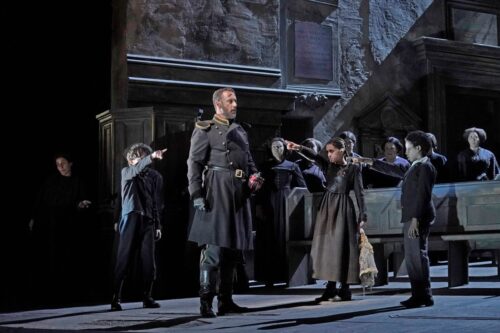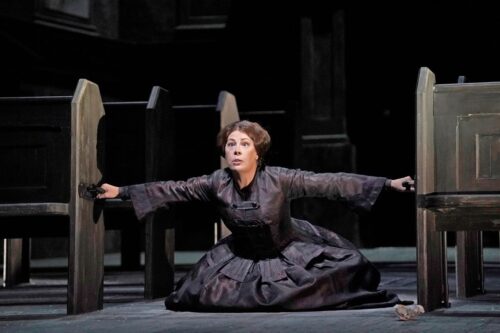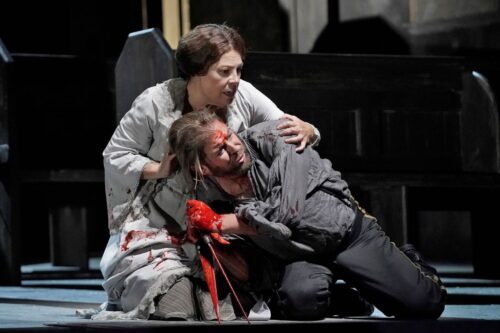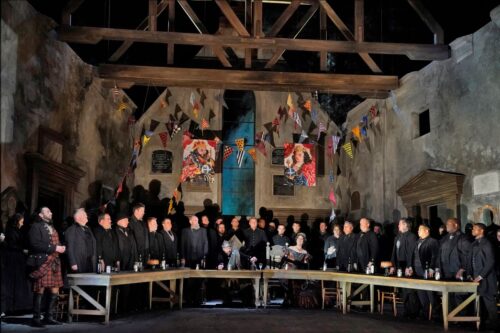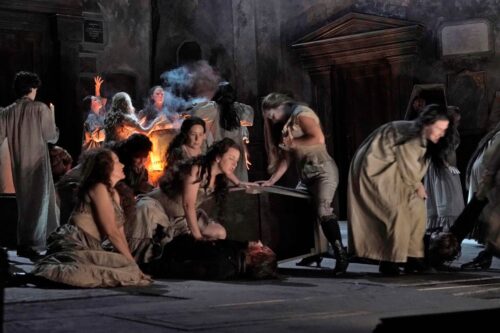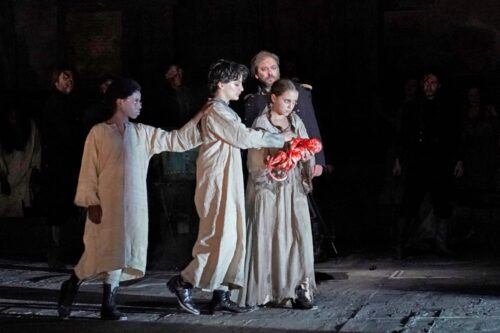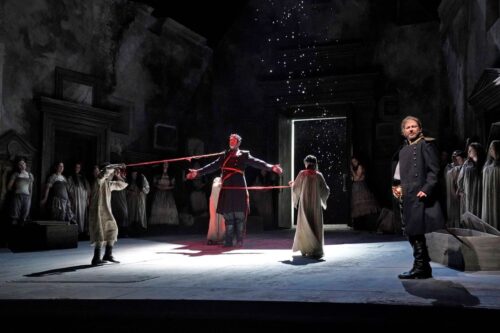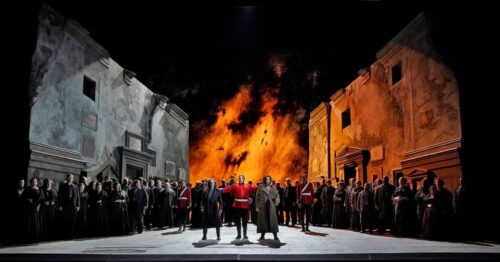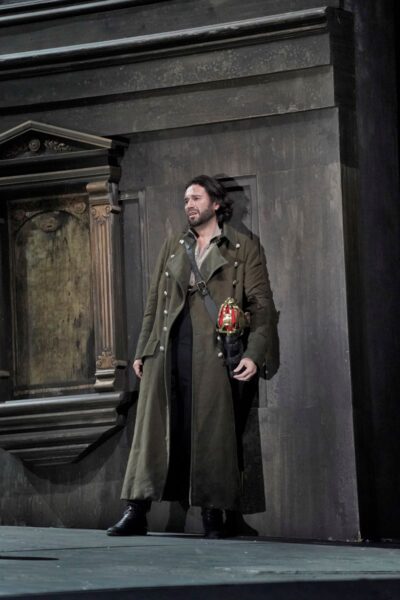ENGLISH PLAY, ITALIAN OPERA, SCOTS-AMERICAN PRODUCTION
The first performance I reviewed of Giuseppe Verdi’s Macbeth was simply terrible, so it was a delight to hear this new production at Lyric. But almost any opera would have been delightful after a pandemic hiatus of eighteen months. Mandatory masking did not fail to dampen the opening night audience’s enthusiasm and exhilaration. Yet, despite the reduction in seating due to the replacement of the older, cramped seats with newer, larger, more comfortable ones, empty seats remained.
Conductor Enrique Mazzola was finally able to stand behind the podium as Lyric’s new music director, succeeding Sir Andrew Davies. His conducting of the opera’s 1865 Paris version was spirited and sensitive. Although Verdi’s revised version of his own 1847 original is less commonly performed, it is baffling to this reviewer why the ballet segments weren’t performed, since that was kind of the whole point of the Paris version.
Since it can be jarring to hear Shakespeare’s Macbeth — frequently referred to as “the Scottish play” — adapted, composed and conducted by Italians, Lyric’s production team includes two Scots: director Sir David McVicar and set designer John MacFarlane. Both are well-known to Lyric audiences, McVicar most recently directing Strauss’s Elektra (2018/19) and MacFarlane designing the set of Tchaikovsky’s The Queen of Spades (2019/20). Both tend to gravitate towards dark and dangerous material — and Macbeth is no exception. Replete with witches, murder, and madness, Macbeth offers plenty of fodder for the imaginative director. McVicar has no qualms, for example, about adding supernumerary roles, such as King Duncan and three demon-like children.
Gone are the castles and cloaks of the Middle Ages. Instead, McVicar has set the action in the nineteenth century, when the operatic version was created. Despite the Catholic tone of both Shakespeare’s play and Verdi’s opera, the setting is a ruined Presbyterian church. MacFarlane adapts it as needed, from a witch’s covenstead to a royal banqueting hall. Yet, what should have been a simple design made for some extended set changes, such as when much of the audience got up to leave during the transition from Act One to Act Two, though the only intermission follows Act Two.
Perhaps the pandemic has made international casting difficult; Lyric’s cast comprises only Americans and members of its own Ryan Opera Center. The outstanding and beloved soprano Sondra Radvanovsky plays Lady Macbeth, easily showing off her technicality and strong, clear voice, while Ryan Opera Center alumnus Christian Van Horn brings his rich, sonorous bass-baritone to the role of Banquo. Tenors Joshua Guerrero and Matthew Vickers both make fine Lyric debuts as Macduff and Malcolm, respectively, lifting the tone of the opera’s second half to something rather more heroic. Unfortunately, Craig Colclough’s Lyric debut as the title character, is underwhelming; it justly took the audience some time to warm up to him, and perhaps he to it. Colclough received only hesitant applause for his Act Three aria, but an enthusiastic applause for his emotionally rendered Act Four aria ’˜Pietà , rispetto, amore.’
As so often happens with Verdi, the Lyric Opera Chorus performed with gusto and pathos, occasionally upstaging the soloists while driving forward the action and maintaining musical momentum. It was probably the chorus more than anything that kept this tired reviewer entirely awake through Macbeth’s more than three hour run time. What glorious singing, whether women or men alone, or all together!
Moritz Junge’s dark costumes were mostly unremarkable, apart from the sparing use of tartan and kilts. The lighting design of David Finn, by contrast, was excellent, utilizing simulated lightning perfectly timed to the score’s more bombastic pulses for dramatic effect and a soft glow generally more throughout the mostly dark production.
Macbeth isn’t one of this reviewer’s favorite stories, but this production comes as close as possible to winning his approval, if not his heart. It could be the opera’s simple lack of romance, which could have been partly remedied by the inclusion of the Paris version’s unique dance scenes. Nevertheless, this new Lyric production makes the unjustly neglected Paris version better known and opens the season on a relatively modest, yet hopeful note.
Macbeth
Lyric Opera of Chicago
Civic Opera House, 20 N. Wacker Drive
ends on October 9, 2021
for tickets, call 312.827.5600 or visit Lyric Opera
for more shows, visit Theatre in Chicago

